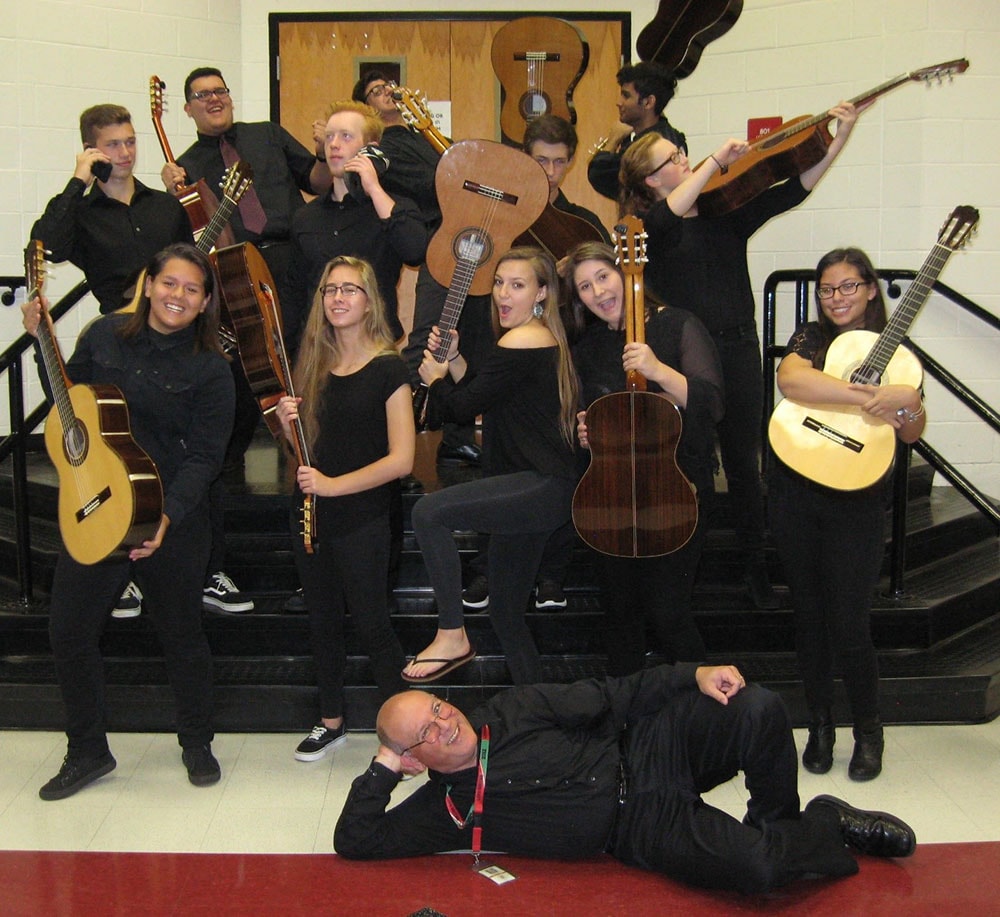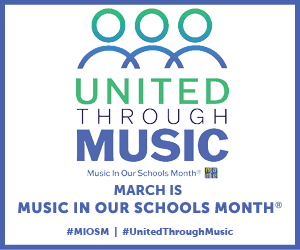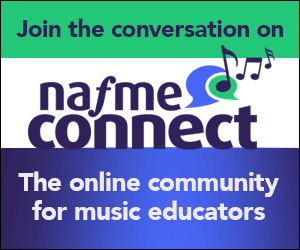/ News Posts / Guitar Class in the Old Dominion
Guitar Class in the Old Dominion
Number 9: Commonwealth of Virginia
By Thomas Amoriello Jr.
NAfME Council for Guitar Education Chair
Dr. Kevin Vigil currently serves on the NAfME Council for Guitar Education as a Member-At-Large Representative. In 2005, he was invited to be a performer/clinician for the Loudoun County Public Schools (LCPS) Guitar Festival. It was at this event that he learned of several guitar openings for the following school year. Without hesitation, he applied for a position. He joined the faculty of Heritage High School in Leesburg, Virginia, and has remained there ever since. Once hired by LCPS, Vigil took an active role to improve the curriculum for guitar. While the Virginia Standards of Learning offered only one level of guitar, there were four levels for instrumental music. Vigil proposed to use instrumental music model to advocate and create a new curriculum. As a result, the new curriculum was adopted in 2008. LCPS now offers Beginning, Intermediate, Advanced, and Artist level guitar classes.
Prior to his position at Heritage High School, he spent fifteen years as a classical guitar teacher, performer, composer, organizer, and author. His interest in secondary school guitar programs began when he met John Graham (Lake Braddock Secondary School, Fairfax County Public Schools) in 1991. Over the years he performed for, coached, and traveled with Graham’s students.
Vigil has served as the Event Chair for the Virginia Music Educators Association’s (VMEA) All-Virginia Guitar Ensemble since 2015. He was recently tasked to propose the creation of a Guitar Council for VMEA.
Dr. Vigil was chosen as the 2014 Shenandoah University Teacher of the Year for LCPS and was presented a Winston Churchill Commemorative Crown by Churchill Scholar Helen Sanderson for his work in guitar education. He holds performance degrees from Shenandoah University (DMA), Yale University (MM), and the University of Memphis (BM).
His pedagogical and educational articles have been published in international journals including the GFA Soundboard, the EGTA Journal, and Gendai Guitar. He has presented lectures on guitar education for the Guitar Foundation of America, Yale University, James Madison University, and others.
You can check out the Heritage High School Artist Guitar Class under direction of Dr. Kevin Vigil performing the World Premiere of Winter Salsa by Miroslav Lončar at Yale University.

Please tell us about your school and overall music program.
I teach at Heritage High School, which is one of fifteen high schools in the Loudoun County Public School system. We offer Band, Choir, Orchestra, Musical Theater, Music Theory, and Guitar.
Please tell us about your own personal musical background growing up and your collegiate experience.
I grew up in Memphis, Tennessee, where my mom was my first musical influence. She is a pianist and organist, but when I was very young, she learned a few chords on the guitar and would sing folk songs with my brothers and me. I was enamored with the guitar when she played. She also started me with piano and organ before sending me to another teacher (Mrs. Holiday).
Piano was my main instrument at that time, but I started showing interest in the guitar as well. I took a group guitar class at the YMCA followed by some private lessons with Mike Love (not from the Beach Boys). Mike taught me “Stairway to Heaven” by Led Zeppelin when I was younger than 10 years old.
I played saxophone in the junior and senior high school band, continued to play piano through most of high school, played in rock bands through early college, played guitar at my church from 8th grade through college, and took private jazz guitar lessons with Lloyd Rainey as a junior and senior in high school.
When I was 18, my dad took me to a Germantown Symphony concert where classical guitarist John Stover was performing the Villa-Lobos concerto. This was the first time I had ever heard or seen classical guitar. His encore was the Bach Prelude in E Major (BVW 1006a). I had played Bach on piano, but I never thought that this was possible on the guitar. I was sold!
I received my BM at the University of Memphis where I studied with John Stover, my MM at Yale University where I studied with Benjamin Verdery, and my DMA at Shenandoah University where I studied with Dr. Glenn Caluda.
“Beginning Guitar is perhaps the most important level of instruction. It is at this point that students form their initial understanding of sound production, posture, technique, literacy, and ability.”
How do the guitar family instruments fit into your teaching?
The majority of our special instruments are used to expand the range of a standard guitar ensemble. To that end, I love programming Dr. Alan Hirsh’s arrangements, which include requinto and contra guitars. I often use soprano guitars to double parts that seem to need a little more attention. I particularly like the combination of soprano, standard, and contra on dedicated bass parts.
This past school year, we acquired a Renaissance lute. The lute is being used as a kind of class pet. Each student in my Artist level class will have the lute in their possession for three weeks. They will learn its history and tablature and transcribe a short piece to standard notation.

What obstacles did you face when you were first hired at your school? Now?
Acronyms—both then and now.
Second to that would be the fact that, when I started, we had only two levels of guitar: Beginning/Intermediate and Intermediate/Advanced. These designations were extremely ambiguous. We now have four levels of guitar instruction: Beginning, Intermediate, Advanced, and Artist. As of this year, we now have an Honors credit option for all our musical ensembles!
The challenge that I face now has to do with the vertical articulation from the middle school guitar program that feeds my high school program. There has been quite a bit of turn over at the middle school, which has impacted retention and the level of instruction. I am working closely with my middle school colleagues to support them in any way that I am able.
What kind of classes related to the guitar do you teach?
I teach Music Theory in addition to four levels of guitar.
What would you like to say to the non-guitarist music educator who is about to or interested in incorporating the guitar into their program?
Find a private teacher with a degree in guitar. This person should be able to guide you on principals of technique and fingerboard logic. Beginning Guitar is perhaps the most important level of instruction. It is at this point that students form their initial understanding of sound production, posture, technique, literacy, and ability. It is important to reinforce good habits at every stage of the learning process. Be honest with your students about your current abilities and let them know that you are learning with them. Most of all, engage your students with your passion for music-making.
While a private teacher is perhaps the best way to develop your skills, there are summer programs that can provide an introduction to guitar education.
“Perhaps the most powerful advocates you can have are your students’ parents. Get to know them.”
Do you have any success stories you would like to share about students (musical or non-musical)?
Of course, I’m very excited when students pursue music after high school whether in performance, production, therapy, education, or for their own enjoyment. Many of my former students are now my colleagues.
Perhaps the most profound success story is about a student who failed my class his senior year. He was a great rock player, but separated himself from the rest of the students. Despite my consistent efforts to get him engaged in the class, he only wanted to do his thing. At the end of the year, I talked with him about his failure. I can still remember him saying, “Whatever” and leaving my room.
Five years later, I received a letter with a return address from the Adult Detention Center. This student had hand-written a three-page letter (front and back). “Dear Dr. V, I’m sorry I that I am writing this from jail. First of all, I didn’t hurt anyone but myself. Secondly, I wanted to apologize for how I was in your class. You were my favorite teacher . . . ” His letter continued with the story of his life in high school and what he was going through at the time. He said that he was not allowed a guitar in jail, but he wanted to learn music theory. He asked if I could send him materials (no staples, paperclips, or colored ink allowed). For the next year or so, we continued a correspondence-type of theory class. After he was released from his time served, he enrolled at the local community college to pursue a degree in music.
What do you tell your talented students who are planning to pursue music or guitar studies in college after they finish with you?
I make it a general practice to expose my students to the various fields in music. Guest artists are great, but the most impact comes from former students who are making a living in the field. They are able to share their stories of challenges and triumphs. This is a real eye opener for many students.
To answer your question more specifically, I tell them that if this is their passion and they are aware of their options, they will find their way to make a living in music. I also tell them that having a degree is better than not having a degree. If you don’t find (or create) your employment in music, many employers like to hire musicians because of the versatile skill sets that they develop along the way.
Do you have any networking or advocacy tools that have helped you promote your program that would help other educators?
Have your students perform in public; you never know who may hear you play. Perform for libraries, community events, local concert series, the school board, and music festivals. All of this brings attention to your program. Other forms of advocacy include writing articles, joining committees, and developing good relationships with your non-musical colleagues and administrators. Perhaps the most powerful advocates you can have are your students’ parents. Get to know them.
What kind of future do you see for guitar in music education in the Virginia school system?
The future of guitar education is bright in Virginia. The Virginia Music Educators Association recently created the VMEA Guitar Council, which I chair. We are moving forward to a point of mutual recognition with our musical colleagues and are excited for what the future holds.
Glen McCarthy founded the VMEA All-Virginia Guitar Ensemble six years ago, and it has flourished. This year’s NAfME All-National Honor Ensembles includes guitar for the first time; six students from Virginia were selected.
I see a future when guitar is fully recognized and implemented in schools at the same level as band, choir, and orchestra. I see a future when more colleges/universities will offer music education degrees with a concentration in guitar. Ultimately, I see a future when all teachers are teaching to their strengths and keeping their students’ best interest in mind.
What type of arrangements and/or transcribing have you done for your school performances?
To be honest, I haven’t done too much arranging or transcribing lately. Instead, if my students are craving to play something that has not been arranged and published for guitar ensemble, I buy the string orchestra edition. This started when Star Wars: The Force Awakens and Jurassic World came out. I wrote to the publisher for permission to arrange the themes for guitar ensemble but was denied. To avoid copyright violation, I had my students play the string orchestra arrangement. This was a great lesson for my students. Some had to play in different clefs (alto or bass), and others had to play an octave higher or lower than what they were accustomed.
Do you do any musical performance or activities outside of your public school teaching duties?
Yes. While I don’t perform as much as I used to, I do continue to play. More recently, my wife Barbara (flute) and I played on a benefit concert for the Aguado Guitar Series and for our church. I played the solo part for Scenes from Ellis Island by Benjamin Verdery for the PAVAN Regional Governor’s School guitar orchestra this summer, and I’ll be playing for Helena Gallego O’Neil’s art exhibit in September. Other than that, I enjoy composing and doing projects. A set of my pieces, “Sketches of Children,” was recently published with Guitar Chamber Music Press, and I’ve been recording videos of these pieces for Guitar Ascendant’s YouTube channel. The same organization produced a series of lectures that I gave called, “Playing the Guitar with Your Brain.”
Any last thoughts to conclude our interview?
Our students are not just numbers, they are kids. Let us always strive to do what is in their best interest.
Past “Guitar Class in 50 States” articles:
- Number 8: The Aloha State (Hawaii)
- Number 7: The Land of Enchantment (New Mexico)
- Number 6: The Sunshine State (Florida)
- Number 5: The Grand Canyon State (Arizona)
- Number 4: The Ocean State (Rhode Island)
- Number 3: The North Star State (Minnesota)
- Number 2: The Silver State (Nevada)
- Number 1: The Garden State (New Jersey)
About the author:

Thomas Amoriello is the NAfME Council for Guitar Education Chair and also serves as the Guitar Education Chairperson for the New Jersey Music Education Association. He teaches guitar for the Flemington Raritan School District and Hunterdon Academy of the Arts. Tom graduated from Shenandoah Conservatory with a Master of Music Degree in Classical Guitar Performance. He is the author of the children’s picture books; A Journey to Guitarland with Maestro Armadillo and Ukulele Sam Strums in the Sand (March 2019), both available from Black Rose Writing. He recently made two vinyl record releases on the H42 Records label of Hamburg, Germany featuring former members of Black Sabbath, Whitesnake, Dio, Ozzy Osbourne, Yngwie J. Malmsteen’s Rising Force, and more.
Published Date
November 20, 2018
Category
- Ensembles
Copyright
November 20, 2018. © National Association for Music Education (NAfME.org)



